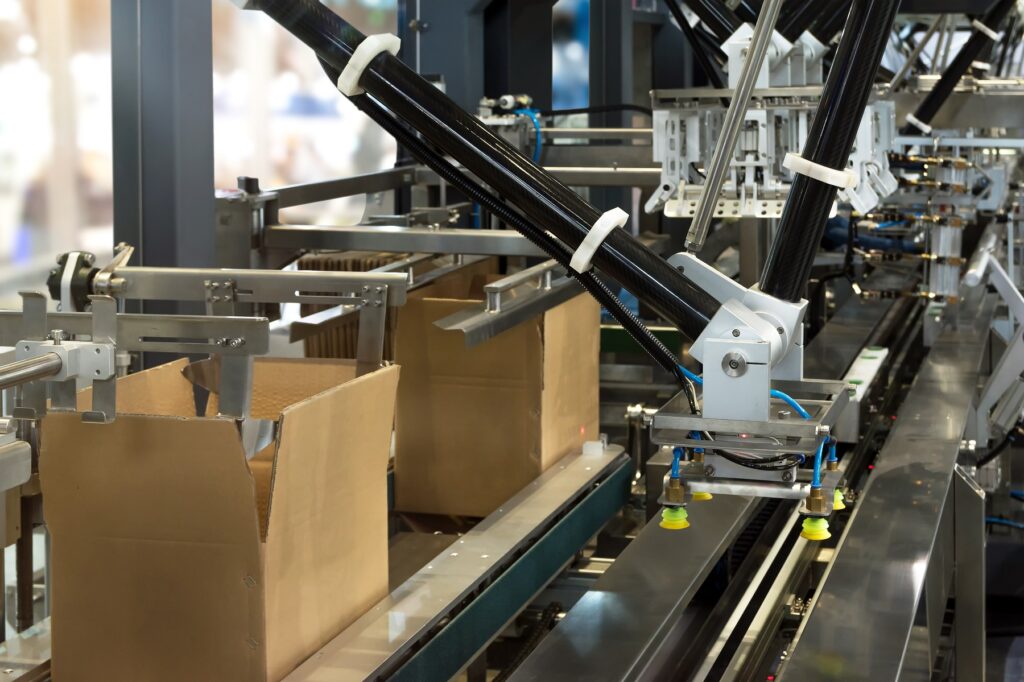
Case sealing machines are integral components in automated packaging systems, sealing boxes and cartons for safe storage and transport. Their efficient operation is essential for maintaining the flow of production lines and ensuring product integrity. However, like any machinery, they require regular maintenance to function effectively and minimize the risk of breakdowns. This article provides a detailed overview of the importance of case sealing maintenance, common challenges encountered, and best practices for maintaining these machines to optimize efficiency and longevity.
Why Maintenance Matters in Case Sealing Machines
Regular maintenance of case sealing machines is critical for several reasons. Whether the machines use tape, glue, or other sealing methods, they need to operate consistently to support high production volumes and deliver quality seals. Here are the key reasons why proper maintenance is essential:
- Ensuring High Operational Efficiency: Efficiently maintained machines are less prone to errors such as tape misalignment, irregular glue application, or unsealed boxes. This helps maintain a consistent output, reducing bottlenecks in production and increasing overall throughput.
- Minimizing Downtime: Equipment breakdowns can cause significant disruptions in production, leading to delays and financial losses. A proactive maintenance program helps detect and fix potential issues before they escalate, keeping the packaging line running smoothly and minimizing unexpected downtime.
- Extending Machine Lifespan: Regular maintenance prevents excessive wear on critical components such as drive belts, sealing heads, and glue nozzles. By inspecting and replacing parts as needed, companies can prolong the life of their equipment, reducing the frequency of costly replacements and major repairs.
- Maintaining Product Quality: Secure and consistent sealing is essential for preserving product integrity, especially for perishable goods, pharmaceuticals, and fragile items. Proper maintenance of the case sealing machine ensures that the packaging remains intact during storage and transport, protecting the products inside.
Common Issues in Case Sealing Machines
Understanding the common challenges faced by case sealing machines is the first step toward effective maintenance. Here are some typical problems and their potential causes:
- Tape Jams and Misalignment: Tape jams or misalignments are common issues in tape-sealing machines. These problems are often caused by worn-out tape heads, improper tape reel loading, or debris accumulation. Regular cleaning and adjustment of the tape heads and guides are essential to prevent these interruptions.
- Belt Slippage: The belts that drive cartons through the sealing process can stretch or wear over time, leading to slippage or misalignment. This issue can cause delays in production and result in improperly sealed boxes. Routine inspection and timely replacement of belts are necessary to maintain proper alignment and movement.
- Inconsistent Glue Application: For machines using hot melt glue, inconsistent glue application can occur due to clogged nozzles, temperature fluctuations, or incorrect glue viscosity. This results in weak seals or partially sealed boxes. Regular cleaning of nozzles and calibration of the glue system are crucial to maintaining consistent seal quality.
- Guide Rail Misalignment: Guide rails ensure that cartons remain aligned during the sealing process. Misaligned or loose rails can cause cartons to shift, leading to incomplete or crooked seals. Checking and adjusting guide rails periodically is vital to ensure they are set correctly for the carton sizes being used.
Effective Maintenance Strategies
To keep case sealing machines running efficiently, Adeptus Engineering recommends implementing a structured maintenance approach. Below are some best practices for maintaining optimal performance:
Routine Maintenance Schedules: Developing a comprehensive maintenance schedule is fundamental to minimizing unplanned downtime. This includes:
- Daily Checks: Visual inspections to identify any obvious issues, such as loose belts, misaligned guide rails, or tape jams.
- Weekly Inspections: More detailed inspections, including checking belt tension, tape alignment, and cleaning critical components like tape heads, rollers, and glue nozzles.
- Monthly Evaluations: Deeper evaluations of the entire system, focusing on component wear, lubrication needs, and system calibration.
Cleaning and Debris Management: Accumulation of dust, adhesive residue, and other debris can impair the performance of sealing machines. Regular cleaning, especially of critical areas such as tape heads, glue nozzles, and belts, helps maintain smooth operation. Using approved cleaning agents ensures that no damage is done to sensitive components.
Component Inspection and Replacement: Critical components like belts, rollers, blades, and nozzles need frequent inspection for signs of wear. For example:
Drive Belts: Belts that show signs of fraying or stretching should be replaced to prevent slippage and maintain proper alignment.
Blades: Dull blades can lead to improper tape cuts, causing tape jams and seal inconsistencies. Replacing blades when they become dull is important for maintaining efficiency.
Glue Nozzles: Regular cleaning and inspection of glue nozzles prevent clogging and ensure consistent glue flow and application.
Calibration of Sealing Systems: Proper calibration is essential for both tape and glue sealing systems. Tape tension must be set correctly to avoid jamming or misalignment, and the glue system’s temperature and flow rate should be adjusted according to manufacturer recommendations to maintain consistent sealing quality.
Operator Training and Knowledge: Well-trained operators are crucial to the effective maintenance of case sealing machines. Training programs should focus on teaching operators to perform basic troubleshooting and maintenance tasks, such as adjusting tape tension, aligning guide rails, and cleaning nozzles. Empowering operators to recognize early warning signs, such as unusual noises or inconsistent seals, can help prevent small issues from becoming major problems.
Leveraging Predictive Maintenance Technology
Advances in technology have enabled predictive maintenance, a more proactive approach that goes beyond traditional preventive methods. Predictive maintenance involves using sensors and monitoring systems to track the real-time performance of case sealing machines. These systems collect data on factors such as vibration, temperature, and component wear, providing early warnings of potential issues.
Adeptus Engineering offers predictive maintenance solutions that integrate with case sealing machines, allowing companies to optimize their maintenance schedules and minimize unplanned downtime. For example, thermal sensors monitor glue temperatures to ensure they remain within the optimal range, while vibration sensors detect early signs of belt or roller issues. By addressing these potential problems before they escalate, companies can maintain continuous production with minimal disruption.
Troubleshooting Common Issues
Operators equipped with troubleshooting skills can quickly address minor issues, reducing reliance on maintenance technicians and minimizing downtime. Here are a few common problems and how to troubleshoot them:
- Tape Jams: Operators should first check the tape path for obstructions and ensure the tape reel is loaded correctly. Cleaning the tape heads and adjusting the tape tension can resolve most tape jam issues.
- Inconsistent Glue Seals: If glue application is inconsistent, operators should inspect the glue nozzles for blockages and verify that the temperature settings are within the recommended range. Adjusting the glue flow rate may also be necessary to achieve consistent sealing.
- Carton Misalignment: Misaligned cartons are often caused by improperly set guide rails. Operators should check the rail alignment and adjust it according to the carton size being processed.
Conclusion
Effective maintenance of case sealing machines is essential for ensuring operational efficiency, product quality, and equipment longevity. By implementing a comprehensive maintenance program that includes routine cleaning, inspection, calibration, and training, businesses can significantly reduce the risk of unplanned downtime and enhance productivity.
Additionally, integrating advanced predictive maintenance technologies, as offered by Adeptus Engineering, allows companies to move beyond reactive maintenance and proactively address issues before they impact production. Investing in proper maintenance ensures that case sealing machines operate at peak performance, providing a reliable, cost-effective solution for packaging needs and ultimately contributing to a company’s overall success.







